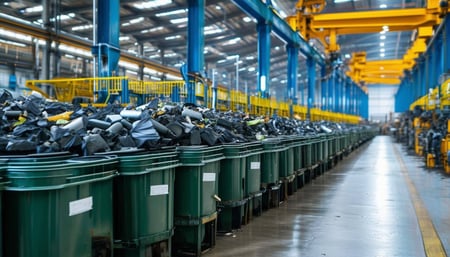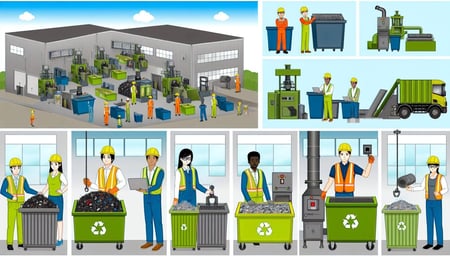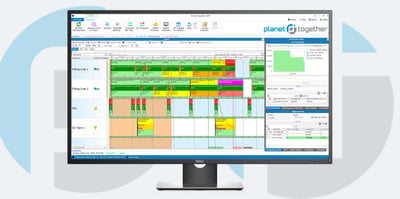Waste Reduction and Management in Industrial Manufacturing
Every component of the production process must be optimized to minimize waste, reduce costs, and maximize output. However, achieving this level of efficiency can be a daunting task, especially for plant managers who are constantly juggling multiple responsibilities.
One powerful solution that has emerged to address these challenges is the integration of advanced planning and scheduling (APS) software, such as PlanetTogether, with enterprise resource planning (ERP), supply chain management (SCM), and manufacturing execution systems (MES). By seamlessly connecting these systems, plant managers can gain unprecedented visibility and control over their operations, leading to significant improvements in waste reduction and management.
In this blog, we will explore the importance of waste reduction in industrial manufacturing and discuss how the integration of PlanetTogether with ERP, SCM, and MES systems can help plant managers achieve their efficiency goals.

The Significance of Waste Reduction in Industrial Manufacturing
Waste is an inevitable byproduct of the manufacturing process, but minimizing its impact is essential for the long-term success of any operation. Waste comes in many forms, including scrap materials, excess inventory, overproduction, and inefficient use of resources such as energy and water.
The consequences of unchecked waste can be severe, ranging from increased production costs and decreased profitability to environmental damage and reputational harm. In today's increasingly competitive market, companies simply cannot afford to ignore the importance of waste reduction.

Challenges in Waste Management
Plant managers face numerous challenges when it comes to managing and reducing waste in their facilities. These challenges can include:
Lack of Visibility: Without real-time data and insights into their operations, plant managers may struggle to identify areas of waste and inefficiency.
Complexity of Production Processes: Modern manufacturing facilities are highly complex, with numerous interconnected systems and processes. This complexity can make it difficult to pinpoint the root causes of waste and implement effective solutions.
Limited Resources: Plant managers are often constrained by limited resources, including time, budget, and manpower. Finding ways to reduce waste without negatively impacting production can be a significant challenge.
Inefficient Planning and Scheduling: Poor planning and scheduling can lead to overproduction, excess inventory, and other forms of waste. Without proper coordination between production activities, resources may be underutilized or allocated inefficiently.


The Role of APS Software in Waste Reduction
Advanced planning and scheduling (APS) software, such as PlanetTogether, offers a powerful solution to many of the challenges associated with waste reduction in industrial manufacturing. By leveraging advanced algorithms and optimization techniques, APS software enables plant managers to:
Optimize Production Schedules: APS software takes into account various factors such as resource availability, production capacity, and demand forecasts to generate optimized production schedules. By minimizing changeovers, reducing setup times, and balancing workloads, APS software helps plant managers maximize efficiency and minimize waste.
Improve Inventory Management: By synchronizing production schedules with inventory levels and demand forecasts, APS software helps plant managers avoid overproduction and excess inventory. This not only reduces waste but also frees up valuable capital that can be invested elsewhere in the business.
Enhance Resource Utilization: APS software enables plant managers to better utilize their resources, including machinery, labor, and materials. By aligning production activities with resource availability, APS software helps minimize downtime and reduce inefficiencies.
Enable What-If Analysis: APS software allows plant managers to conduct what-if analysis to simulate different production scenarios and evaluate their potential impact on waste and efficiency. This enables plant managers to make more informed decisions and proactively address potential issues before they arise.

Integration with ERP, SCM, and MES Systems
While APS software offers many benefits on its own, its full potential is realized when integrated with other key systems, including ERP, SCM, and MES. Integration enables seamless data sharing and communication between these systems, providing plant managers with a holistic view of their operations and enabling more informed decision-making.
ERP Integration: By integrating with ERP systems such as SAP, Oracle, or Microsoft Dynamics, APS software can access critical data related to inventory levels, customer orders, and financial transactions. This enables more accurate demand forecasting, inventory planning, and production scheduling, leading to reduced waste and improved efficiency.
SCM Integration: Integration with SCM systems enables APS software to incorporate external factors such as supplier lead times, transportation constraints, and market demand into production planning and scheduling decisions. This ensures that production schedules are aligned with supply chain dynamics, minimizing disruptions and reducing waste.
MES Integration: Integration with MES systems provides real-time visibility into shop floor operations, including machine status, production progress, and quality control metrics. This enables APS software to adapt production schedules in response to changing conditions, such as equipment breakdowns or quality issues, minimizing downtime and maximizing efficiency.
Waste reduction is more important than ever in industrial manufacturing. By leveraging advanced planning and scheduling (APS) software such as PlanetTogether and integrating it with ERP, SCM, and MES systems, plant managers can achieve significant improvements in efficiency, productivity, and profitability.
The integration of PlanetTogether with systems such as SAP, Oracle, Microsoft Dynamics, and MES enables seamless data sharing and communication, providing plant managers with the insights and capabilities they need to optimize their operations and minimize waste.
As we look to the future of industrial manufacturing, the integration of advanced technologies will continue to play a crucial role in driving innovation and efficiency. By embracing the power of integration, plant managers can unlock new opportunities for growth and success in the years to come.
Are you ready to take your manufacturing operations to the next level? Contact us today to learn more about how PlanetTogether can help you achieve your goals and drive success in your industry.



